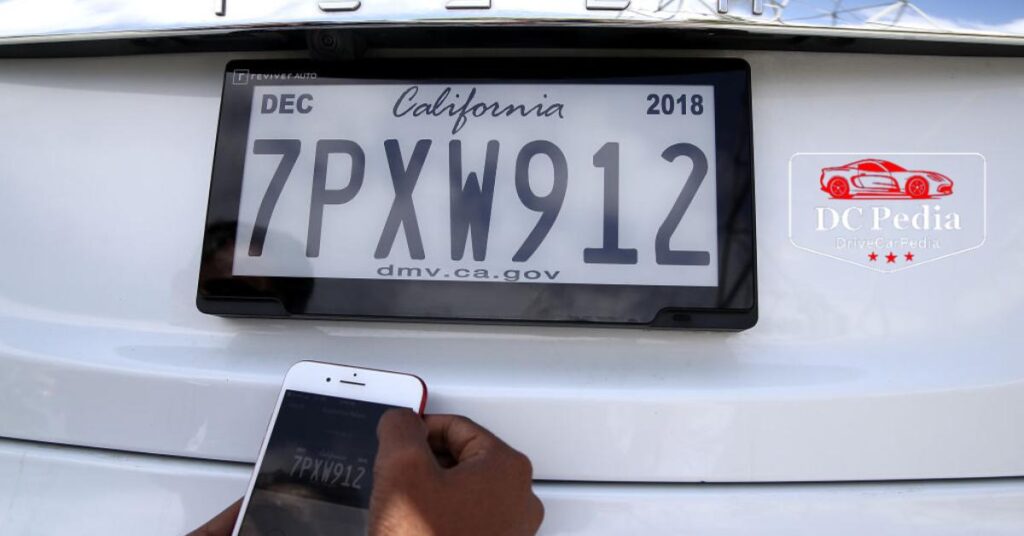Imagine this scenario – you’re cruising down the highway when another car suddenly cuts you off, nearly causing an accident. Filled with road rage, you think to yourself, “I wish I could find out where that jerk lives and teach them a lesson.”
But can you really lookup someone’s home address just from their license plate number? It’s a common belief, but also an unsettling privacy concern for many drivers in the United States. Let’s investigate the truth and uncover what’s actually possible.
What’s On A License Plate Anyway?
Before we dive in, it’s important to understand exactly what information is contained on a license plate itself. These mandatory metal or plastic plates are issued by the government to serve as a unique identifier for each registered vehicle on public roads.
A typical license plate displays:
- A series of numbers
- Potentially some letters as well
- Occasionally symbols like the state’s name abbreviated (PA for Pennsylvania, for example)
However, crucially, a license plate number alone does NOT contain the vehicle owner’s name, address, or any other explicit personally identifying information.
It’s simply an uncomplicated code matched to that specific automobile for administrative purposes like:
- Processing tolls
- Tracking parking violations
- Identifying vehicles during traffic incidents
As Sandra MacQueen, a 20-year veteran DMV clerk in Ohio relates, “A plate number is really just a code, like an ID number assigned to each car – it doesn’t tell you anything about who the human owner is or where they live.”
So in that sense, just reading the jumble of characters and digits printed on someone’s license plate won’t magically reveal their home address to you.
So Can I Just Type In The Plate And See The Owner’s Address?
The direct answer is: No, you cannot simply enter a license plate number online or into an app and pull up the registered owner’s name and home address. A plate number by itself does not directly expose that sensitive personal information to random searchers.
However, here’s the important caveat – while not directly visible, your address could potentially get uncovered through other means if someone has your license plate number. There are a few ways this could happen:
Enter Paid Private Lookup Services
In our modern digital age, a whole industry has emerged offering Vehicle History Report and license plate lookup services online. For a subscription fee, these providers will scan records databases they’ve compiled and attempt to match a plate number to:
- The registered owner’s full name
- Current and past addresses the vehicle has been registered to
- Additional vehicle details like make, model, age, etc.
“It’s kind of like hiring a private investigator to run a background check on you, but purely based on your license plate instead of other personal details,” explains Julie Polk, a vehicle historian at AboutAutoPast.com.
These lookup services can vary significantly in their level of success, largely depending on the state. Some states are more restrictive about the vehicle records they’ll share publicly for aggregation, while others are more open.
So if you live in a stringent data privacy state like California, paid lookup services may struggle to surface your address tied to your plate. But in more lenient states, your name, personal details, and past address histories are more exposed and discoverable if someone is determined to pay to find it.
The DMV: Gatekeeper Of Vehicle Records
The reason those lookup services have any data at all is because each state Department of Motor Vehicles (DMV) maintains the master database containing detailed registration records for every licenced driver and vehicle.
When you register a new vehicle or update your license, the DMV diligently logs:
- Your full name
- Current home address
- Vehicle information
- Ties all those identifiers to your new license plate number
So in their systems, your plate is definitely connected to your name, date of birth, residence, and other personal data. The DMV is the gatekeeper and authoritative source for this valuable registered vehicle universe.
| Data Point | Example |
|---|---|
| License Plate Number | ABC-1234 |
| Vehicle Make & Model | 2019 Honda Civic |
| Vehicle Color | Blue |
| Registered Owner Name | John D. Parker |
| Owner Date of Birth | 05/18/1985 |
| Owner Residence Address | 123 Main St, Anytown VA 12345 |
However, accessibility protocols are in place to protect this sensitive information from широко распространение. Law enforcement does have special clearance to freely lookup DMV files during active investigations that require identifying a vehicle or driver.
But for civilians, options are extremely limited. The DMV restricts open record requests about a vehicle’s registered owner address or contact details. Generally, you’d need to formally negotiate the proper documentation and legal justification under your state’s privacy laws, often involving fees as well.
Even paid lookup services don’t have unrestricted access. They can only access and resell the specific portions of vehicle data that state DMVs allow to be made publicly available through private purchase.
Other Sneaky Ways Someone Could Try
While not incredibly reliable or guaranteed to work, an obsessive person examining your license plate number does have a few other sneaky potential options they might attempt to uncover your identity and address, including:
1) Scouring Online Photos and Public Records
In our highly-connected, image-sharing obsessed world, there’s always a chance your license plate number could be inadvertently captured in online photos, aerial maps, social media posts, or other public records.
Say you posted an Instagram shot that caught your front license plate in frame. A wily person could use that to baselineconnect your plate to your identity, then cross-reference any other digital trails you may be accidentally leaving behind containing personal details.
2) Exploiting Vanity/Custom or Pattern Plates
Some drivers opt to pay extra fees for customized “vanity” license plates containing unique letter/number combinations, sometimes with personal meaning or flair.
David Lopez recounts his experience from working at the DMV: “You’d occasionally get customers who wanted very distinctive plates, like with their initials, nickname, or birthday incorporated in a clear pattern. Those types of self-identifiers make it much easier to connect that plate to the actual registered owner.”
So in cases of highly personalized plates, it opens up another potential avenue to employ human ingenuity at deciphering the code and tying it back to a specific individual’s identity that’s now more exposed.
3) Getting Sneaky with Vehicle Affiliates
For company or commercial vehicles bearing plates registered to a business, there’s an outside chance inquiring with that employer about the vehicle assignment could uncover the personal contact details of the individual staff member or driver.
Or perhaps trying to contact a leasing company, insurer, or any other affiliates connected to that specific vehicle in their records and attempting to wheedle information out of them through clever social engineering.
The Privacy Bottom Line
At the end of the day, your license plate number is designed as a standard inventory ID for your vehicle – not an open book into your personal life and home address. State DMVs, lawmakers, and federal privacy regulations work to restrict how much of your sensitive registration information is accessible to randos lurking around.
Could a determined, savvy individual employ clever Internet sleuthing and potentially piece together clues to discover where you live if they had your plate number? It’s conceivable, but highly improbable without serious effort on their part.
As Sgt. Carl Wilbur of the Maryland State Police Cyber Security Division bluntly states: “Do people rarely have the time, means, and gall to go lengths to that for something so trivial? Not really. They move on to mess with someone else’s life.”
Realistically, the laws and system controls in place mean counts are overwhelmingly in your favor that randos can’t easily locate your name, personal details or home address just from your license plate number alone.
So sleep easy knowing your registered vehicle isn’t a personal address billboard to every weirdo out there – at least for now in this era of (reasonable) data privacy protection.
Frequently Asked Questions
What information can you get from a license plate
Private investigators (PIs) possess the capability to conduct license plate checks to uncover various pieces of information, including the addresses of vehicle owners. In cases where they have legitimate grounds to do so, PIs can also access details such as property holdings, bankruptcy records, criminal records, and sex offender registrations.
Can someone find your address from license plate Canada?
Can someone in Canada find out your address based on your license plate, and if so, how? Sure, if the aggressor works for a police department or knows someone who does, they can find your address using only your license plate.
Can I find out who owns a car by the number plate Australia?
It’s important to note that while private individuals cannot usually access ownership information solely through a license plate, various services like car history from Carfacts provide comprehensive vehicle history reports and checks.
How can I find the details of a car by number?
Vehicle Registration Check through SMS in Punjab
For vehicles registered in Punjab, send the vehicle number to 8785.
Can you look up the owner of a license plate in California?
It is only legal to look up license plate numbers in California if you are a company, law enforcement agent, or other approved person. Typically, you will need a signed consent form from the individual owner, and you must provide proof of your use of the data.
How do I check my car registration in the USA?
You can search with a vehicle identification number (VIN), or you can search with a valid license plate number and state. Searching via a license plate and state is a terrific option if you can’t find the VIN, it’s hard to read or your car has no VIN. In the box below, simply enter the license plate number and state.
Read More:
Final Thoughts
As this investigation uncovered, a license plate number alone should not directly expose your name or home address to prying eyes in the modern United States. However, there are still some loopholes and methods a highly motivated individual could try to uncover that sensitive information if they really wanted.
So if you have particular security concerns or just value your family’s privacy, here are some tips:
- Look into getting a license plate cover to obscure it when not driving
- Max out any suppression options when registering vehicles to limit record circulation
- Be cautious about publicly posting identifiable photos of your car/plate
- Consider registering vehicles in a spouse or LLC’s name to obscure the records
Have any other insights or personal experiences dealing with license privacy and plate exposures? Share your thoughts in the comments! And for more security tips, check out our guide on protecting your internet home router.



